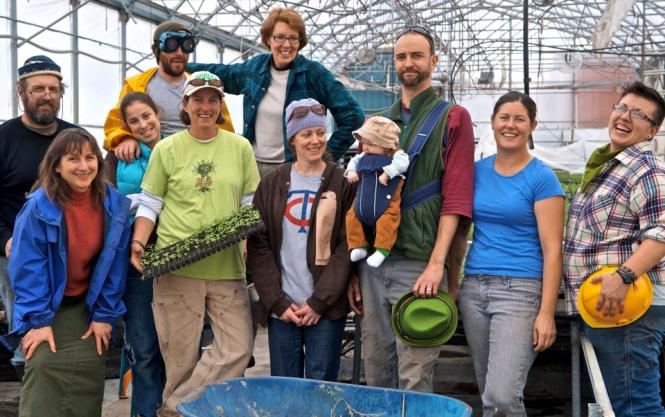This is the third post in a summer-long series from a young farmer working as a harvest crew leader at Gardens of Eagan. Check out previous posts, Laying New Roots and When Farmers Stay Dry.
I like to say I farm for the vegetables, for the extremely attractive year-round farmer’s tan, for the long days outside, for the dirt that sleeps in lines of my hands, for the knowledge that my work rarely wounds the earth. But though the fruits of my labor sustain me, the friendships I make, the relationships I build, and the wealth of knowledge I glean from the community around me, also keep me coming back to the farm for more.
---
Before moving to Minnesota in January, I spent two seasons farming in the rich and fertile Hudson Valley at Phillies Bridge Farm Project. Situated just below the Shawangunk Mountain Ridge in New Paltz, New York, Phillies Bridge lies across 65 acres, most of which remains protected in a nature preserve. The land we farmed, nestled amongst maple, pine, and oak trees whose leaves ignite with an orange fire come fall, bustled with life: goats and potato beetles, chickens and horn worms, pigweed and lettuce, preschoolers and tired apprentices, kittens and sneaky dogs. Aside from attending college in Vermont, my first experiences away from home, outside of my family and the comfort of the familiar, occurred at Phillies Bridge.
During my two seasons in New York, I lived in a small room on the farm. Only eight by ten feet with a lofted bed, my space felt confining, cluttered, and claustrophobic. Surrounded by the other strong and differently directed women I would farm alongside all season, our bunkhouse quickly became an open space of refuge and comfort.
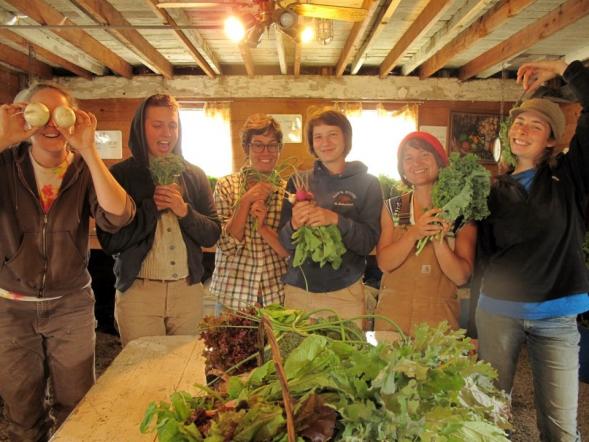 Phillies Bridge Farm Crew
Phillies Bridge Farm Crew
When I first arrived at Phillies Bridge, I retreated into a shell of timidity. Not even twenty-one at the start of my first season, I was the youngest apprentice, naive and a little homesick. But after a month, Mary-Kate (MK), Ayelet (Yelly), Stephanie (Peffie), and I became a sort of makeshift family, sharing our stories and experiences, becoming entwined in each other’s lives. Forty-five to fifty hours a week we worked our bodies in the field, giving ourselves over to the sun and soil. When the days ended, we curled up together, reading books from forgotten booklists, dreaming of our future farms, and telling the stories of our other lives.
To pass time in the fields we spoke in imitated accents: Boston, Jersey, Queens, Southern. We carried each other through the days, aching for home, for rest, for a moment of stable, silent stillness. And through transplanting, weeding, and harvesting we not only studied and dissected our plants, but dug for hidden stories and long kept secrets, told only from one hoeing pass to the next.
As the sun dipped behind the horizon each day and we decided whether or not the stink and filth we carried on our bodies merited a shower, we communed around the dinner table, sharing meals and family recipes. Stephanie made her grandmother’s famous stuffed cabbage rolls, we feasted on Ayelet’s rendition of delicious Israeli cholent, and scarfed down Mary-Kate’s daring black bean brownies, vegan and gluten-free. True of most farmers, meals both replenish our bodies, and also allow our raw crops to take shape and explore the art behind our strained muscles and sore backs.
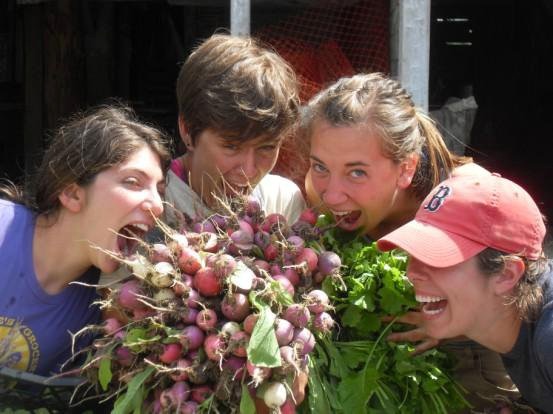 The Phillies Bridge crew after radish harvest
The Phillies Bridge crew after radish harvest
Through a tradition carried on by our fearless leader and eater, Anne (Annabelle), food quickly became the centerpiece for our farming lives together. Everyday we dug into a meal prepared by one crewmember, which they would take anywhere from thirty minutes right before noon to hours the night before to prepare, throwing together butter, herbs, spices, and the bounty of our fields together in a pan and then serving us a delicious hot lunch.
It was over lunches my next season on the farm that I first connected with Amanda, Kayla, Nina, and Willis and learned that they, too, spoke in accents in the fields and dreamed of farms together and far away.
Initially, the transition proved difficult for me – tradition, habit, and expectations twisted me up inside and made me fearful of finally showing my true self. Running back to the farm just after graduating from college, my techniques felt rusty and my confidence felt low. Ask my crewmembers and they will most likely tell you I sat quiet at lunch my first day back and only after a few rounds of arm wrestling and farm song harmonies, did I slowly step into their bubble.
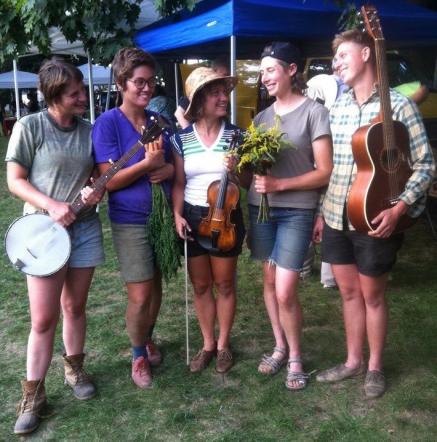 The Phillies Bridge apprentices play music at the farmers market
The Phillies Bridge apprentices play music at the farmers market
And through both seasons we all argued over transplant spacing and when to call it quits at the end of the day and if we should really spend time pulling the newly emerging chickweed cotyledons. Sometimes we didn’t agree on sociology or politics or fat consumption (in butter, of course), but we rarely allowed our momentary sour feelings to taint our relationships and affect our community health and stability. Because, in the end, we all sweat together, our mouths go dry at the same time, and our bodies all ache for sleep when the sun slips away for the evening.
Time will not strip me of my memories working alongside each group of strong farmers, lovingly called my “farmily.” We supported each other, nurtured each other, and challenged each other in many different ways, while always working toward maintaining farm health and happiness. Healthy agriculture grows from healthy, well-supported farmers. For our plants to grow tall and healthy, to reach up for the sun and down for the nutrients floating in soil, we must stand at the ready, prepared to cater to their every desire. Without the guiding hands of my farm managers, present and past, and the comforting smiles of my fellow crewmembers to usher me into my own farming self-confidence, I would stand, hula hoe in hand, helpless and hungry, waiting to make my next move.
---
Gardens of Eagan only became a new farming home for me five weeks ago. Though early, I already feel connected to my fellow crewmembers. I carpool everyday from the Twin Cities with Michael, a recent advertising man, converted to farming only two years ago, and Molly, a farm traveler with hopes to start a CSA sometime in the near future. During our daily travels, we connect through weekend updates, talk of ice cream flavors, and aching for a beer at the day’s end. Sometimes, we argue about staying late to work on the employee garden (that’s right, we’re crazy and have an employee garden). But that’s our only point of contention.
At the farm, we bond with Holly, a Carleton College student who follows farming during her summers, on the butt dragger, an implement that drags you behind a tractor allowing you to drop a plant into a trough and then cover it with rotating disks. We discuss fat consumption and fermentation projects over lunch with Ashley and Beth, greenhouse employees who live in Northfield. We catch glimpses of our other co-workers, Eric and Jackie in the greenhouses, Linda and Libby in the office, John and Mike on the tractor, Julio and Bob with the power tools fixing absolutely everything, Susan washing away in the pack-shed and we feel their roles and know their differences, but understand that we all support each other, whether we spend the day with dirt under our fingernails or produce availability lists in our hands, in a myriad of ways.
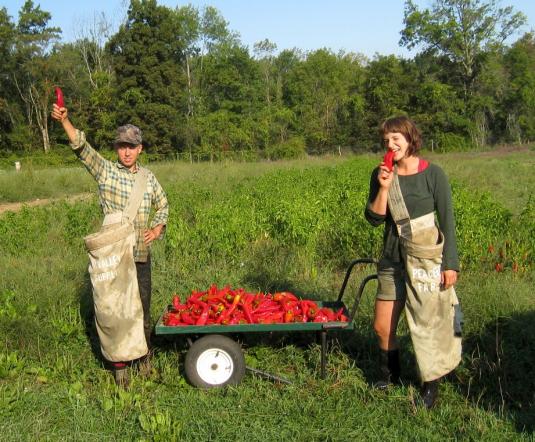 Happily working together at Phillies Bridge Farm
Happily working together at Phillies Bridge Farm
This season not only feels exciting because of the new land I will learn to tend, but because of the new community I will begin to cultivate. Rooted in many places, our small crew weaves together many different stories, diverging paths, and complex histories. While our methods, ambitions, and motivations may not overlap, our energy comes together to create a network and support system that allow our plants and our community to thrive. I once thought that organic, sustainable, and fair farming created the basis for a strong community, but I know now that a strong community builds and healthy and productive farm.
Often I romanticize farming, view our work as painful beauty, act as though I look forward to our grueling tasks every day. But sometimes farming sucks. Sometimes being hot, choking on greenhouse humidity, swatting at constant mosquito bites, swallowing back tired, hungry yawns takes a toll on sanity and stability. Farming breaks down your body, often pays little, and fails to send you home with proper appreciation. But somehow, we do it anyway. Committed to revitalizing, reconstructing, and rethinking our current food system, farming feels right, purposeful, and grounded. I chose my career. I do not farm because of family or history or necessity. I farm for some romantic notion of completion, of feeling whole, of wanting nothing else. And I feel that same drive and commitment from my co-workers, and I keep digging.
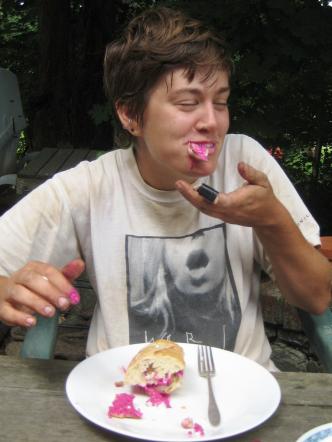
Katie Willis is a native of Birmingham, Alabama, where she grew up with NASCAR, twangs and drawls, and lots of fried okra. Her farming career began on an urban farm in Birmingham, where she ate arugula and swiss chard for the first time in her life. Eventually she moved to rural New York to work with chickens, goats, and really strong women. She enjoys a rowdy round of arm wrestling, discussions on all things related to heternormativity, seasonal food preservation, long bike rides, Toni Morrison, and ice-cold beer. Katie recently moved to the Twin Cities with her girlfriend, Lily. They live in Powderhorn and eat lots of butter, maple syrup, and frozen kale. This year marks her seventh season with soil underneath her fingernails and a bounty in her fridge. Her last post for SGT was Farm Journal: When Farmers Stay Dry.

